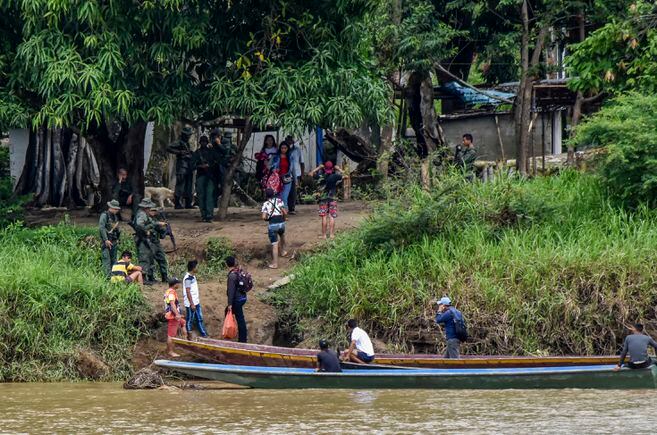
Venezuelan Defense Minister Vladimir Padrí confirmed on Monday that eight soldiers have died during fighting in a border area with a group of FARC dissidents.
“So far there have been nine casualties of these terrorist groups and, unfortunately, we have suffered the loss of eight comrades of the Bolivarian National Armed Forces (FANB), said Padrí in an appearance without questions about the fighting that began on March 21 in the state of Apure (border with Colombia).
You may be interested in: Apuri, the epicenter of violence in Venezuela
The information disseminated so far by military sources has been very scarce and they have not even clarified which armed group they face, although they have released photos of uniforms confiscated with the logos and acronyms of the former FARC guerrilla . Several associations with members in the area have also confirmed that they are FARC dissidents.
Padrí also did not confirm which group the members of the gang against which they are fighting belong to and which, in addition to the 8 dead, caused injuries to 34 uniformed men “who have received medical assistance in the military health network”, of which 21 “they have been discharged with all their treatments.” During the operation, they have deactivated 16 antipersonnel mines installed by the armed group which, he acknowledged, has affected soldiers and “army ground means”.
The Venezuelan state of Apuri has been left as the epicenter of a bloody political chess, in which numerous illegal armed groups coexist due to a cruel and permanent state abandonment. While the accusations come and go on the part of the governments of Colombia and Venezuela, blaming responsibilities, near 6,000 people they arrived at Arauquita (Araucan) fleeing from a conflict other people’s to them.
Sebastiana Barráez, a Venezuelan journalist specializing in military issues, told this newspaper on March 27 that this time the Venezuelan army “has flattened a lot of houses and arrested many people. And although this situation is still unclear , or who the detainees are, there are indications that some of them are civilians, not guerrillas. ” In videos known for the Spectator businesses can be seen looted while the local community denounces the military.
“Where the operation took place (March 21) is an area called the Urdaneta Parish, in the municipality of Páez, in the state of Apuri. In this area, particularly, is where the structure of the front 10 of The FARC-Ep has grown more, and it makes sense, because Arauquita was the strongest control area of the FARC prior to demobilization. economic, I wouldn’t say territorial, but it does control and has strengthened drug trafficking routes, ”Naryi Vargas, a social researcher on territorial security issues told this newspaper on March 27th.
Activate special defense zone
Padrí commented that, by order of President Nicolás Maduro, a “special temporary comprehensive defense operational zone” has been activated in the field, which will be commanded by Major General Alejandro Javier Benitez Marcano with “a coordinating staff.”
You may be interested in: “Dissidents seek to turn the population into allies”: Sebastiana Barráez
They also activated a comprehensive brigade, called Black First, under the command of General Wilfredo Alexander Medrano, “to whom the necessary military units and equipment will be assigned.” The Minister of Defense also explained that Maduro “has ordered extraordinary measures”, which include the formation of “a security zone in the municipalities of Páez, Muñoz and Romulo Gallegos”, all of them in Apuri and where they have been developed most fights.
As part of these interventions, the Strategic Operational Command of the FANB will design and execute “special public security plans that address the destabilizing actions” that threaten peace, personal security and “the protection of facilities and public and private goods “to” guarantee internal order, civil peace and human rights. “
He also commented that this commando, through the Apuri comprehensive defense operational area and together with the civil, regional and municipal authorities, “the heads of protecting human rights”, must establish restrictions and schedules for traffic. .
You may be interested in: Eln abuses and crimes and dissent in Arauca and Apuri
Similarly, they will impose “schedule restrictions for the operation of public and private places,” in addition to implementing security control measures “to ensure public services and citizen peace.”
The military will conduct inspections
Finally, Padrí clarified that the military deployed in the area “may carry out inspections on movable and immovable property in accordance with current laws and regulations”, as well as “evict illegal occupations of public goods that affect the security and defense of the nation “.
He also warned that military units “will intervene to restore free traffic in urban or rural areas in the event that it is disrupted”, as well as launching “other actions to ensure free development and peace in the region”. According to the minister, after three weeks of clashes and 17 deaths, “the region is returning to normal”